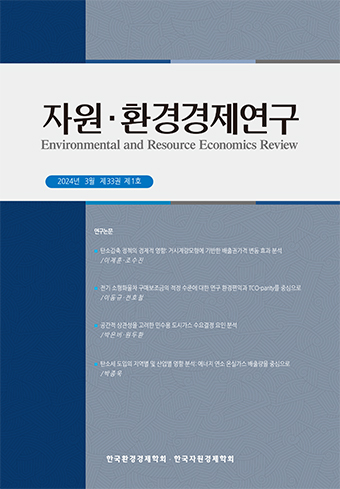Research Paper
Abstract
References
Information
Uncertainty of renewable energy such as photovoltaic(PV) power is detrimental to the flexibility of the power system. Therefore, precise prediction of PV power generation is important to make the power system stable. The purpose of this study is to forecast PV power generation using meteorological data including particulate matter(PM). In this study, PV power generation is predicted by support vector machine using RBF kernel function based on machine learning. Comparing the forecasting performances by including or excluding PM variable in predictor variables, we find that the forecasting model considering PM is better. Forecasting models considering PM variable show error reduction of 1.43%, 3.60%, and 3.88% in forecasting power generation between 6am~8pm, between 12pm~2pm, and at 1pm, respectively. Especially, the accuracy of the forecasting model including PM variable is increased in daytime when PV power generation is high.
태양광 발전과 같은 신재생에너지의 불확실성은 전력계통의 유연성을 저해하며, 이를 방지하기 위해서는 정확한 발전량의 사전 예측이 중요하다. 본 연구는 미세먼지 농도를 포함한 기상자료를 이용하여 태양광 발전량을 예측하는 것을 목적으로 한다. 본 연구에서는 2016년 1월 1일부터 2018년 9월 30일까지의 발전량, 기상자료, 미세먼지 농도 자료를 이용하고 머신러닝 기반의 RBF 커널 함수를 사용한 서포트 벡터 머신을 적용하여 태양광 발전량을 예측하였다. 예측변수에 미세먼지 농도 반영 유무에 따른 태양광 발전량 예측 모델의 성능을 비교한 결과 미세먼지 농도를 반영한 발전량 예측 모델의 성능이 더 우수한 것으로 나타났다. 미세먼지를 고려한 예측 모형은 미세먼지를 고려하지 않은 예측 모형 대비 6~20시 예측 모형에서는 1.43%, 12~14시 예측 모형에서는 3.60%, 13시 예측 모형에서는 3.88%만큼 오차가 감소하였다. 특히 발전량이 많은 주간 시간대에 미세먼지 농도를 반영하는 모형의 예측 정확도가 더 뛰어난 것으로 나타났다.
- 관계부처합동, “2030년 국가 온실가스 감축목표 달성을 위한 기본 로드맵 수정안”, 2018.
- 관계부처합동, “미세먼지 관리 종합대책”, 2017.
- 구경민, “Support Vector Machine 을 이용한 micro array gene expression data 의 분류”, Doctoral dissertation, 연세대학교 대학원, 2002.
- 국회 산업통상자원중소 벤처기업위원회 소속 김삼화 의원실, “미세먼지 높았던 3.1-6일과 직전 6일 발전량 비교”, 2019.
- 김광인‧김현수‧조인구, “에너지 전환정책과 발전의 사회적 비용 -제7차와 제8차 전력수급기본계획 비교- ”, 「자원‧환경경제연구」, 제28권 제1호, 2019, pp. 147~176.
- 문성은‧장수범‧이정혁‧이종석, “기계학습 및 딥러닝 기술동향”, 「한국통신학회지 (정보와 통신)」, 제33권 제10호, 2016, pp. 49~56.
- 배국열‧장한승‧성단근, “기계학습 기반의 태양광 출력예측 및 예측 오차 분석”, 「한국통신학회 학술대회논문집」, 2017, pp. 13~14.
- 산업통상자원부, “재생에너지 3020 이행계획”, 2017.
- 산업통상자원부, “제8차 전력수급기본계획”, 2017.
- 서미숙‧조홍종, “미세먼지가 삶의 만족도에 미치는 영향:WTP 추정을 중심으로”, 「자원‧환경경제연구」, 제26권 제3호, 2017, pp. 417~449.
- 서유진, “미세먼지 심한 날, 태양광 발전량 19% 줄어”, 「중앙일보」, 2019.3.13.
- 손정훈‧정수종, “태양광 발전량에 영향을 미치는 미세먼지에 관한 연구”, 「한국환경정책학회 학술대회논문집」, 2019, pp. 52~54.
- 송재주‧정윤수‧이상호, “태양광 발전을 위한 발전량 예측 모델 분석”, 「디지털융복합연구」, 제12권 제3호, 2014, pp. 243~248.
- 안드레아스 뮐러‧세라 가이도, 파이썬 라이브러리를 활용한 머신러닝, 한빛미디어, 2017.
- 에너지경제연구원, “신재생에너지 보급 확산을 대비한 전력계통 유연성 강화방안 연구”, 2017.
- 에어코리아[웹사이트], (2019.9.1), https://www.airkorea.or.kr/web/airMatter?pMENU_NO=130.
- 이강혁‧김우제, “서포트 벡터 회귀를 이용한 24시간 앞의 태양광 발전량 예측”, 「한국정보기술학회 논문지」, 제14권 제3호, 2016, pp. 175~183.
- 이건주‧이기현‧강성우, “미세먼지와 기상정보 기반의 AHP 분석을 통하여 태양광 발전소 최적입지선정에 대한 사례연구”, 「대한안전경영과학회지」, 제19권 제4호, 2017, pp. 157~167.
- 이순환‧김해동‧조창범, “국지 기상 요소에 의한 태양광 발전량 변동특성에 관한 연구”, 「한국환경과학회지」, 제23권 제11호, 2014, pp. 1943~1951.
- 조덕기‧이태규‧전일수‧전홍석, 오정무, “고산지대의 일사량 특성분석”, 「한국태양에너지학회 논문집」, 제16권, 제2호, 1996, pp. 49~63.
- 조성준‧강석호, “머신러닝(인공지능)의 산업 응용”, 「ie 매거진」, 제23권 제2호, 2016, pp. 34~38.
- 차왕철‧박정호‧조욱래‧김재철, “지리‧지형‧기상자료를 활용한 태양광발전량 예측에 관한 연구”, 「한국조명‧전기설비학회 2014 춘계학술대회 논문집」, 2014, pp. 211~212.
- 한진목‧최수광‧김세웅‧정영관, “공기 중의 미세먼지에 의한 태양전지의 오염에 관한 연구”,「한국수소 및 신에너지학회 논문집」, 제29권 제3호, 2018, pp. 292~298.
- 환경부, “교토의정서 이후 신 기후체제 파리협정 길라잡이”, 2016.
- 환경부, “바로 알면 보인다. 미세먼지, 도대체 뭘까?”, 2016.
- Cortes, C., and V. Vapnik, “Support-vector networks,” Machine Learning, Vol. 20, No. 3, 1995, pp. 273~297.10.1007/BF00994018
- da Silva Fonseca Jr, J. G., T. Oozeki, T. Takashima, G. Koshimizu, Y. Uchida, and K. Ogimoto, “Use of support vector regression and numerically predicted cloudiness to forecast power output of a photovoltaic power plant in Kitakyushu, Japan,” Progress in photovoltaics: Research and applications, Vol. 20, No. 7, 2012, pp. 874~882.10.1002/pip.1152
- Das, U. K., K. S. Tey, M. Seyedmahmoudian, S. Mekhilef, M. Y. I. Idris, W. Van Deventer, B. Horan, and A. Stojcevski, “Forecasting of photovoltaic power generation and model optimization: A review,” Renewable and Sustainable Energy Reviews, Vol. 81, 2018, pp. 912~928.10.1016/j.rser.2017.08.017
- Drucker, H., C. J. Burges, L. Kaufman, A. J. Smola, and V. Vapnik, “Support vector regression machines,” In Advances in neural information processing systems, 1997, pp. 155~161.
- Mei, H. W., and J. J. Ma, “Photovoltaic Power Generation Forecasting Model with Improved Support Vector Machine Regression Based on Rough Set and Similar Day,” In Advanced Materials Research, Vol. 805, 2013, pp. 114~120.10.4028/www.scientific.net/AMR.805-806.114
- Müller, K. R., S. Mika, G. Rätsch, K. Tsuda, and B. Schölkopf, “An introduction to kernel-based learning algorithms,” IEEE transactions on neural networks, Vol. 12, No. 2, 2001, pp. 181~201.10.1109/72.91451718244377
- Müller, K. R., A. J. Smola, G. Rätsch, B. Schölkopf, J. Kohlmorgen, and V. Vapnik, “Predicting time series with support vector machines,” In International Conference on Artificial Neural Networks, Springer, Berlin, Heidelberg, 1997, pp. 999~1004.10.1007/BFb0020283
- Nasien, D., S. S. Yuhaniz, and H. Haron, “Statistical learning theory and support vector machines,” In 2010 Second International Conference on Computer Research and Development, 2010, pp. 760~764.10.1109/ICCRD.2010.183
- OECD.Stat[Website], (2019.9.1), https://stats.oecd.org/index.aspx?queryid=72722.
- Ramli, M. A., S. Twaha, and Y. A. Al-Turki, “Investigating the performance of support vector machine and artificial neural networks in predicting solar radiation on a tilted surface: Saudi Arabia case study,” Energy conversion and management, 105, 2015, pp. 442~452.10.1016/j.enconman.2015.07.083
- Sharma, N., P. Sharma, D. Irwin, and P. Shenoy, “Predicting solar generation from weather forecasts using machine learning,” In 2011 IEEE international conference on smart grid communications (SmartGridComm), 2011, pp. 528~533.10.1109/SmartGridComm.2011.6102379
- Shi, J., W. J. Lee, Y. Liu, Y. Yang, and P. Wang, “Forecasting power output of photovoltaic systems based on weather classification and support vector machines,” IEEE Transactions on Industry Applications, Vol. 48, NO. 3, 2012, pp. 1064~1069.10.1109/TIA.2012.2190816
- Smola, A. J., and B. Schölkopf, “A tutorial on support vector regression. Statistics and computing,” Statistics and Computing, Vol. 14, No. 3, 2004, pp. 199~222.10.1023/B:STCO.0000035301.49549.88
- Twomey, S., “The influence of pollution on the shortwave albedo of clouds,” Journal of the atmospheric sciences, Vol. 34, No. 7, 1977, pp. 1149~1152.10.1175/1520-0469(1977)034<1149:TIOPOT>2.0.CO;2
- Vakili, M., S. R. Sabbagh-Yazdi, S. Khosrojerdi, and K. Kalhor, “Evaluating the effect of particulate matter pollution on estimation of daily global solar radiation using artificial neural network modeling based on meteorological data,” Journal of cleaner production, Vol. 141, 2017, pp. 1275~1285.10.1016/j.jclepro.2016.09.145
- Vapnik, V., The nature of statistical learning theory, Springer science & business media, 1995.10.1007/978-1-4757-2440-0 8555380
- Publisher :Environmental and Resource Economics Review
- Publisher(Ko) :자원 · 환경경제연구
- Journal Title :자원·환경경제연구
- Journal Title(Ko) :Environmental and Resource Economics Review
- Volume : 28
- No :4
- Pages :467~495
- DOI :https://doi.org/10.15266/KEREA.2019.28.4.467



 자원·환경경제연구
자원·환경경제연구






